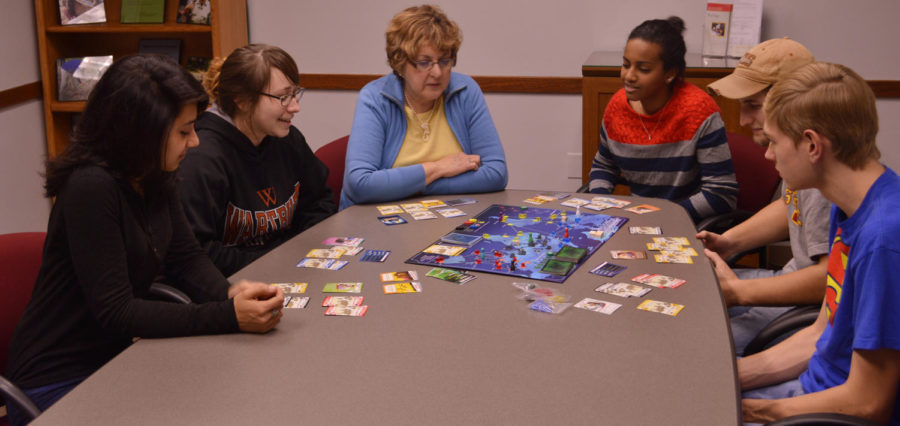Lois Girton and learning communities
Lois Girton, middle, recent receiver of the Outstanding Peer Mentor Supervisor Award, plays the game Pandemic with a group of peer mentors and students being mentored. Left to right: Iman Kashmola, junior and peer mentor; Lillian Howard, junior and peer mentor; Lois Girton; Umnia Mahgoub, freshman being mentored; Jeremy Schuster, freshman being mentored; and Jered Stratton, junior and peer mentor.
December 4, 2013
Each year at Iowa State, there is an opportunity for peer mentors from every learning community on campus to nominate their supervisors for a peer mentor supervisor award.
This year, Lois Girton, academic adviser in the genetics department, was the recipient of the award. Girton is in charge of the “Genetics — The Secret of Life” learning community on campus.
“The awards are presented at the annual peer mentor recognition event at the end of April. I attended to honor my peer mentors and hoped that one of them would receive the outstanding peer mentor award for which she had been nominated by the students. So I was focused on that rather than on the supervisor award and it came as a surprise,” Girton said.
“It was nice to receive the award because it shows that my peer mentors are responsible and caring individuals who took time to put together the nomination.”
Learning communities are small groups of students within a certain major that meet periodically to discuss different topics that relate to their studies. Learning community members are required to enroll in a certain amount of classes together, making their class schedules quite similar. This gives members a chance to get to know each other.
“Learning Communities, especially those for freshmen, are extremely important to the first-year experience … they help students adjust to campus and provide a built-in venue for students to build relationships with fellow classmates, upperclassmen and to a certain extent, faculty within their major,” Girton said.
Dennis Chamberlin, professor in the Greenlee School of Journalism and Mass Communication and leader of the journalism learning community, echoed Dr. Girton’s feelings.
“The university uses learning communities as an integration tool to help the students,” Chamberlin said. “With a lot of the learning communities on campus, it is used as a way to retain students and get them really engaged with the school.”
Each year before class starts in the fall, Girton invites every student enrolled in her genetics learning community over to her house for ice cream. She feels that this is a great way for the students to get to know each other.
As for the learning community itself, Girton explained that there are many different learning outcomes for the course.
“[We want to] foster connections between students, peer mentors, staff and faculty to increase knowledge of the requirements, sequencing, course content and other policies pertaining to the major, colleges and university so that students make informed decisions and appropriate progress towards completion of the degree,” Girton said.
“We also want to educate and inspire participants about the current and future impact of genetics and the various career paths that genetics alumni are prepared to take.”
Girton does not restrict all of her learning community activities to the classroom, something she says that her students love.
“We try to provide a balance of social and educational activities in the learning community. As a small community of about 40 students and four peer mentors, we are able to offer field trips and service learning opportunities,” Girton said. “I also pair each student with an alumnus to interview for one of the class assignments to highlight the great variety of careers that our alumni pursue.”







